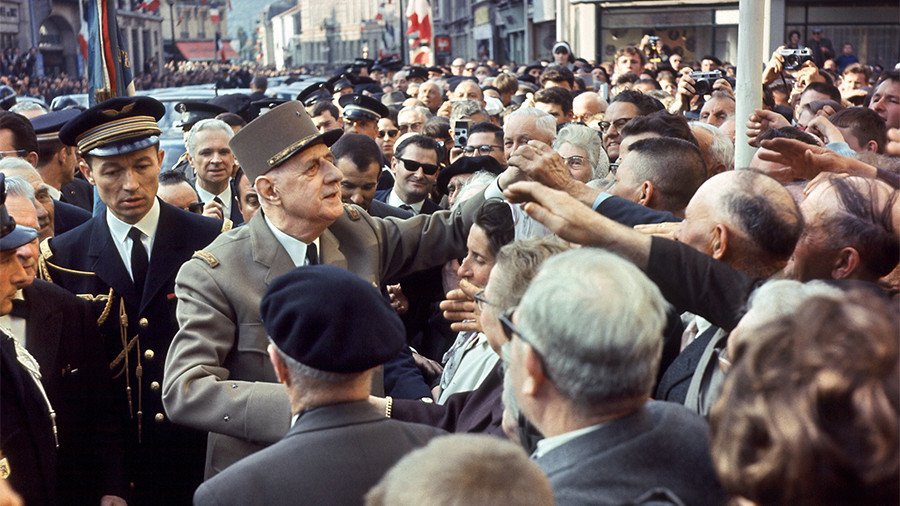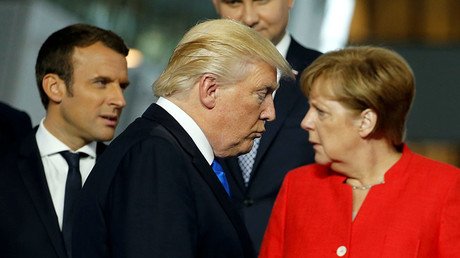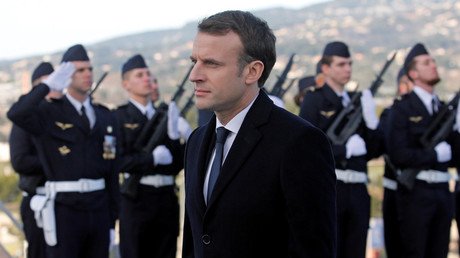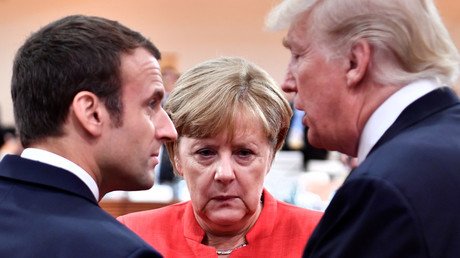Remembering May '68: Why France needs a new de Gaulle more than ever

This month is the 50th anniversary of student-led riots against Charles de Gaulle. Today France is also wracked by unrest but there are genuine reasons to protest as Macron, unlike de Gaulle, is a real enemy of the working-class.
In many ways you could say it was the first attempt at a 'color-coded' regime-change. Charles de Gaulle was the honest soldier who had helped save his country three times, playing a heroic role in two world wars and coming to its rescue again in 1958 when the Fourth Republic hit the rocks.
While labelled 'right-wing' on account of his conservative stance on social issues, he nevertheless had a view on the economy that was a million miles away from that of Margaret Thatcher or Ronald Reagan. In fact you could say that on bread-and-butter issues de Gaulle was way to the left of most social democratic politicians. "He was a man who did not care for those who owned wealth; he despised the bourgeois and hated capitalism," wrote his biographer Jean Lacouture.
Under de Gaulle, no fewer than 170 publicly owned firms played a prominent role in the French economy. There were ambitious infrastructure/engineering projects, such as the development of the supersonic airliner Concorde (a joint production with Britain) and the construction of new motorways. The French people enjoyed years of growth and rising living standards. In 1962 the Organisation for Economic Co-operation and Development (OECD) paid tribute to the "extraordinary vitality" of the French economy. In 1964, France's GDP growth was 6.4 percent.
The protests against de Gaulle that did spring up in 1968 were actually a sign of his success. These were not demonstrations from the desperate but from mainly bourgeois ultra-leftist students who were doing very nicely under an 'old-fashioned' regime they claimed to detest.
The ostensible cause of the protests - overcrowding in student accommodation - was a result of the big expansion in higher education under de Gaulle. The university campus where the disturbances began, in the Paris suburb of Nanterre, had seen numbers rise from 2,000 in 1964, to 15,000 in 1968. Student leader Danny Cohn-Bendit later admitted: "It was a revolt not a revolution".
Proof of this can be seen by who was backing the students and who wasn't. French Communist Party leader George Marchais memorably described Cohn-Bendit and his fellow protestors as "sons of the upper bourgeoisie… who will quickly forget their revolutionary flame in order to manage daddy's firm and exploit workers there."
The Soviet Union also preferred de Gaulle - a man who supported détente with Moscow and who ran a quasi-socialist economy, to the 'left-wing' rioters. In 1998 the Irish Times reported on a memo sent from Valerian Zorin, the Soviet Ambassador to France, to Soviet Foreign Minister Andrey Gromyko and Boris Ponomarev, head of the International Department of the Communist Party. "Those [students] from the working class represent only 10 per cent, and what is more, the students are in the grip of leftist and Trotskyist elements," was Zorin's verdict.
The CIA line, by contrast, was more critical of de Gaulle, who in 1966 had taken France out of NATO's military command and had become a fierce critic of the Vietnam War.
"The Gaullists have repeatedly violated and perverted their own constitution," CIA Head Richard Helms fumed in his report to President Johnson. "They have treated even the moderate opposition with disdain and indifference."
In 1975 it was revealed that the CIA had been asked to help kill de Gaulle in 1965, but we don't know what the agency's response was.
What we do know is that for the US the fiercely independent de Gaulle was a pain in the butt and his removal in 1968 by 'left-wing' protestors - with their focus on identity politics and lifestyle issues would have been warmly welcomed.
In his biography of de Gaulle, Jonathan Fenby notes that Gaullist ministers believed that the students were being funded from abroad via Swiss bank accounts - with the sources of finance said to include the US, Israel and China, Cuba and Bulgaria. He also records how the US Ambassador to France, Sargent Shriver, noted the prospect of a new administration which would be "more positive, less grandiose and more in harmony with American policy". The Americans almost got what they wanted.
The air of rebellion spread to the shop floor and at one point around 10 million workers were out on strike. The situation looked to be out of control, but the communist-led General Confederation of Labour (CGT) was keen for demands to be limited to better pay and conditions and for workers to keep some distance from the students. George Seguy, the CGT leader, expressly warned against 'irresponsible provocation'.
Seguy's strategy was the right one and led to the government agreeing to average wage increases of 10 percent, a 35 percent rise in the minimum wage and a reduction in working hours from 1970. De Gaulle, in a broadcast to the nation on May 24, promised a referendum on increased worker participation. Regime change was thwarted.
Fast forward fifty years and the man at the helm in France could not be more different. Emmanuel Macron could be said to represent everything that de Gaulle opposed. De Gaulle believed in national sovereignty, Macron is a globalist. De Gaulle hated capitalism, Macron, a former investment banker, adores it. De Gaulle supported de-colonization - taking France out of Algeria, Macron wants to build a 'new Syria'. De Gaulle always tried to do the right thing by the workers, Macron is taking the workers on. De Gaulle thought politics was too important to be left to the politicians and preferred direct democracy, Macron is an establishment insider and an instinctive anti-populist. De Gaulle cared little for personal wealth - and in fact died a relatively poor man, Macron earned nearly $4m from his time working on corporate takeovers.
Macron used to be a rich investment banker but reports his finances have greatly diminished.
The good general would, I'm sure, be devastated if he could see the state of his beloved country today. Thousands have taken to the streets in Paris to protest against Macron's neoliberal reforms.
Banners included the slogans 'Down with the President of the rich!' and 'No to a social coup d'etat!'.
Once again there are university protests, but this time students are angry about Macron's plans to make higher education access more selective.
As in 1968 industrial workers are also involved, but this time, it's not about trying to achieve wage increases - but preserving the French way of life. In her recent article, longstanding French resident Diana Johnstone stressed the "deep significance" of Macron's battle with railway workers. "What has made France a good place to live for more than half a century is not just food and landscapes. Above all, it is the public services, the best in the world."
Unsurprisingly in France today there is tremendous nostalgia for 'Les Trente Glorieuses', the years when Gilbert Becaud wrote the music and dirigiste Gaullist economics held sway.
The general's foreign policies are also sorely missed. The day that France finally ditched those was the day Nicolas Sarkozy was elected as President in 2007. I remember the occasion well, as I was due to appear on television with Alan Mendoza of the neocon Henry Jackson Society. He couldn't conceal his delight that France was now going to be a strong US ally.
In 2009, Sarkozy duly restored his country to NATO's military command, and then two years later, it played a key role in the military alliance's destruction of Libya, the country which had the highest Human Development Index in the whole of Africa. The intellectual widely credited with persuading Sarkozy to bomb was one Bernard Henri-Levy, a 'soixante-huitard'.
Fifty years on from 'les evenements' which almost toppled him, it's clear that France, and indeed the world, needs a new Charles de Gaulle more than ever.
Follow Neil Clark @NeilClark66
The statements, views and opinions expressed in this column are solely those of the author and do not necessarily represent those of RT.


















